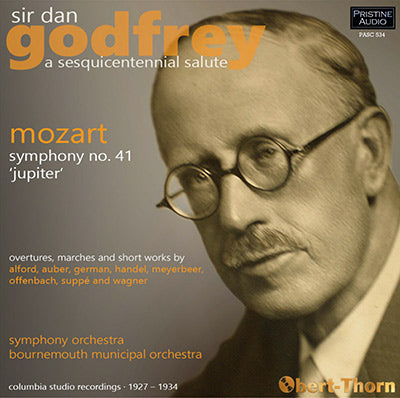
This album is included in the following sets:
This set contains the following albums:
- Producer's Note
- Full Track Listing
- Cover Art
The present release celebrates the 150th anniversary of the birth of Sir Dan Godfrey (20 June 1868 – 20 July 1939), founder of the ensemble known today as the Bournemouth Symphony Orchestra. Godfrey was the son of a highly-esteemed bandmaster of the Grenadier Guards. When the elder Godfrey showed little interest in an offer to organize a series of summer concerts at the seaside resort town of Bournemouth in 1893, his son applied in his place and won the post. By that time, the 25-year-old Godfrey had already completed studies at the Royal College of Music, conducted the London Military Band for two years, and served as musical director of an opera company in South Africa.
The summer season proved to be an immediate success, and Godfrey worked to have the ensemble established on a permanent basis. Over the following 41 years, he built the Bournemouth Municipal Orchestra into one of Britain’s finest ensembles. His efforts to champion British music in particular led to his knighthood in 1922, following a campaign organized by composer Ethel Smyth.
In his monograph Sir Dan Godfrey & the Bournemouth Municipal Orchestra (1970), Stuart Upton writes that Godfrey was “a spectacular showman” who “had a star-quality of a rare order, similar in certain ways to that of Arthur Fiedler” of the Boston “Pops”, but that Godfrey was “in certain respects a much finer artist” who was “as much at home with the greatest music in the symphony concerts as with a novelty foxtrot on Saturday night.”
A bit of the former can be glimpsed in Godfrey’s 1927 recording of the “Jupiter” Symphony. During a period in which Columbia was recording Mozart symphonies with Beecham, Harty, Weingartner and Walter, it was a particular vote of confidence in Godfrey’s abilities to allot the “Jupiter” to him. The “Symphony Orchestra” employed both here and in the Wagner march was most likely the LSO, which had recently switched allegiance to HMV and so could not be credited on Columbia’s discs. Godfrey’s approach is in some ways the antithesis of Albert Coates’ supercharged performance recorded with the same ensemble a few months later (Pristine PASC 455).
The Handel and Meyerbeer coupling was Godfrey’s last recording, made two months before his final concert. That same performance featured the Edward German dances, which Godfrey had played at his Bournemouth première and had also filmed for a Pathé short in 1931 (currently on YouTube). The three overtures are good examples of Godfrey’s stylish and energetic way with light Classics. And no Godfrey program would be complete without the inclusion of one of his “novelty” numbers, often written by and/or featuring soloists from the orchestra.
Very little of Godfrey’s recorded legacy has been available since the 78 rpm era. Aside from a couple tracks in EMI Bournemouth SO anniversary collections and others in a Guild “Light Music” CD series, the only previous reissue devoted to Godfrey of which I am aware was a Symposium disc featuring his acoustic recordings of Vaughan Williams’ London Symphony. Nearly all the items in the present collection are appearing in extended play form for the first time, most surprisingly in the case of the Mozart “Jupiter”.
Mark Obert-Thorn
SIR DAN GODFREY: A Sesquicentennial Salute
MOZART: Symphony No. 41 in C major, K551, “Jupiter”
1. 1st Mvt.: Allegro vivace (8:12)
2. 2nd Mvt.: Andante cantabile (7:09)
3. 3rd Mvt.: Menuetto: Allegretto & Trio (3:51)
4. 4th Mvt.: Finale: Molto allegro (7:03)
Recorded 4 February 1927 ∙ Matrices WRAX 2432/9 (Columbia L 1938/41)
5. HANDEL: Largo from Xerxes (4:41)
Recorded 22 July 1934 ∙ Matrix CAX 7231 (Columbia DX 620)
6. MEYERBEER: Coronation March from Le Prophète
(4:12)
Recorded 22 July 1934 ∙ Matrix CAX 7230 (Columbia DX 620)
7. WAGNER: Homage March (Huldigungsmarsch) (5:59)
Recorded 23 March 1927 ∙ Matrices WRAX 2524/5 (Columbia L 2002)
EDWARD GERMAN: Three Dances from Henry VIII
9. Shepherd’s Dance (2:57)
10. Torch Dance (1:29)
Recorded 16 – 17 March 1928 ∙ Matrices WA 8235/6 (Columbia 5577)
11. SUPPÉ: Pique Dame – Overture (7:21)
Recorded 29 April 1928 ∙ Matrices WAX 3572/3 (Columbia 9496)
12. AUBER: The Bronze Horse – Overture (7:00)
Recorded 29 April 1930 ∙ Matrices WAX 5565/6 (Columbia DX 69)
13. OFFENBACH: Orpheus in the Underworld – Overture
(8:57)
Recorded 18 March 1934 ∙ Matrices CAX 7116/7 (Columbia DX 593)
14. K. J. ALFORD: The Two Imps (3:51)
W. Byrne and W. W. Bennett (xylophone soloists)
Recorded 29 April 1928 ∙ Matrix WAX 3569 (Columbia 9505)
Symphony Orchestra (Tracks 1 – 4 & 7)
Bournemouth Municipal Orchestra (Tracks 5 – 6 & 8 – 14)
Sir Dan Godfrey (conductor)
Producer and Audio Restoration Engineer: Mark Obert-Thorn
Cover artwork based on a photograph of Sir Dan Godfrey
Special thanks to Nathan Brown, Jim Cartwright’s Immortal Performances, Inc. and Charles Niss for providing source material
Symphony Orchestra recordings made in the Scala Theatre, London
Bournemouth Municipal Orchestra recordings made in the old Winter Gardens (1928) and the Pavilion (1929 – 34), Bournemouth
Total Timing: 74:38

